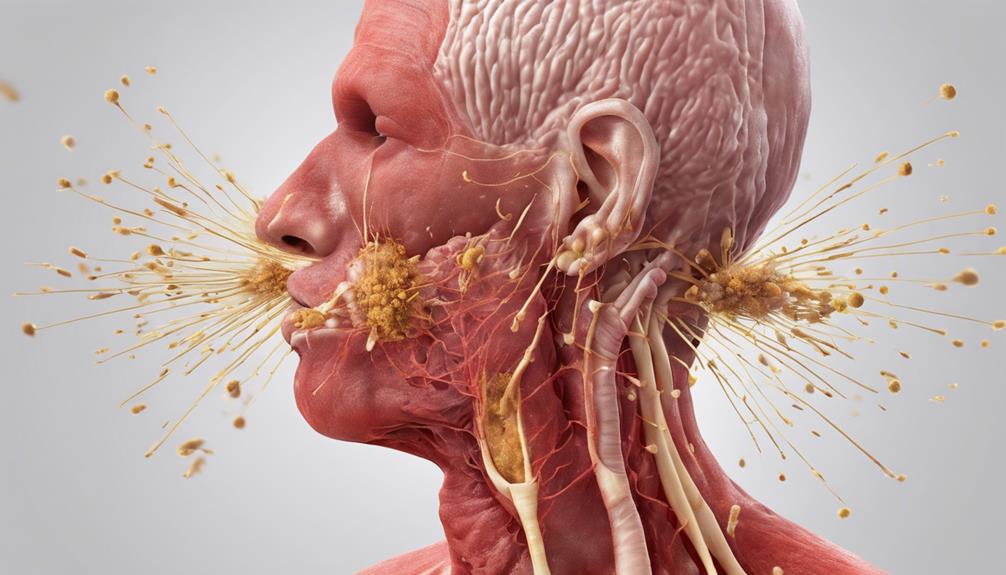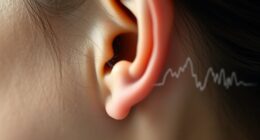As we delve into the intricate connection between migraines and hearing loss, it seems like we are unraveling a perplexing puzzle with elusive pieces that are challenging to connect.
The intricate dance between these two seemingly disparate conditions has piqued the curiosity of researchers and health professionals alike, shedding light on a compelling relationship that warrants further exploration.
The implications of this correlation extend beyond mere discomfort, hinting at deeper insights into the intricate workings of our bodies that may hold the key to understanding and addressing these interconnected health challenges.
Key Takeaways
- Migraines induce vasospasms, restricting cochlear blood flow.
- Auditory issues are common in two-thirds of migraine sufferers.
- Migraines can trigger sudden sensorineural hearing loss.
- Understanding and managing migraines is crucial for preserving auditory health.
Understanding the Migraine-Hearing Loss Connection
Research findings illuminate the intricate relationship between migraines and hearing loss, shedding light on the mechanisms underlying this correlation. Migraines, known for their debilitating headaches, can also have a profound impact on the auditory system. The compromised blood supply during migraines can lead to vasospasms, where the blood vessels constrict, cutting off essential blood flow to the cochlea in the inner ear. This restricted blood flow can result in damage to the delicate hair cells within the cochlea, affecting the transmission of sound signals to the brain.
Furthermore, migraines can cause abnormalities in cochlear function and auditory pathways. These abnormalities can affect two-thirds of individuals who suffer from migraines, indicating a significant link between the two conditions. The potential for migraines to cause sudden sensorineural hearing loss highlights the importance of monitoring one's auditory health, especially for those prone to migraines. Understanding these connections can aid in early detection and intervention to mitigate the impact migraines have on hearing abilities.
Impact of Migraines on Auditory System

The intricate relationship between migraines and hearing loss reveals the significant impact migraines can have on the auditory system, particularly in compromising blood supply and potentially leading to hearing impairment. When migraines strike, they can trigger vasospasms that restrict blood flow to the inner ear, jeopardizing cochlear function. This interference can result in sudden sensorineural hearing loss, a condition where sound signals from the inner ear to the brain are disrupted.
Further, studies have indicated a connection between migraines and abnormalities in the auditory pathways, hinting at a complex interplay between these conditions. Additionally, the vasospasms that occur during migraines can affect the cochlear vessels, leading to reversible hypoxic injuries and temporary hearing impairments. Understanding these mechanisms sheds light on how migraines can impact the auditory system and highlights the importance of managing migraines effectively to preserve hearing health.
- Vasospasms during migraines can cause sudden sensorineural hearing loss.
- Migraines are linked to abnormalities in cochlear function and auditory pathways.
- Cochlear vessels may experience reversible hypoxic injuries due to migraine-related vasospasms.
Managing Migraine-Related Hearing Issues
To effectively manage migraine-related hearing issues, a comprehensive approach integrating migraine treatment and auditory care is crucial. Migraines can induce vasospasm, leading to compromised blood supply in the auditory system and resulting in sensorineural hearing loss. Tailored treatment strategies are essential to address these associated auditory symptoms effectively. Research supports the combination of migraine management with oral corticosteroids to improve hearing loss linked to migraines. Steroids, commonly used in sudden sensorineural hearing loss treatment, show promise in aiding hearing recovery in migraine cases. Annual hearing tests are recommended for individuals with migraines due to the established correlation with hearing loss.
| Management Strategies | Benefits |
|---|---|
| Migraine Treatment Combined with Oral Corticosteroids | Improved hearing loss associated with migraines |
| Tailored Treatment Plans | Effective management of auditory symptoms |
| Annual Hearing Tests | Early detection and monitoring of hearing issues |
| Steroid Treatment | Aid in hearing recovery in migraine-induced hearing loss |
Research on Migraines and Hearing Loss

Having understood the correlation between migraines and compromised auditory function, exploring the underlying mechanisms can provide valuable insights into the relationship between migraines and hearing loss. Research on migraines and hearing loss has shed light on several key points:
- Compromised Blood Supply: Two-thirds of migraine sufferers exhibit compromised blood supply during migraines, potentially leading to abnormalities in cochlea function and auditory pathways.
- Vasospasm and Inner Ears: Vasospasm during a migraine can trigger a sudden cut-off of blood supply to the auditory system, affecting the inner ears and causing sensorineural hearing loss.
- Increased Risk: Migraine sufferers are almost twice as likely to experience sudden sensorineural hearing loss, a rare condition with approximately 4,000 cases reported annually in the US.
Understanding these connections between migraines and hearing loss can aid in developing more targeted interventions and treatments to mitigate the impact of migraines on auditory health.
Protecting Hearing Health During Migraines
During migraines, protecting hearing health is crucial due to the potential risks of compromised blood supply and increased susceptibility to hearing loss. The small arterioles supplying blood to the auditory system can be affected during migraines, leading to compromised blood supply to the cochlea and auditory pathways. This reduced blood flow can result in sudden sensorineural hearing loss, making it essential to monitor hearing capacity regularly for any signs of impairment during migraines.
To safeguard hearing health, individuals experiencing migraines should consider wearing hearing protection and minimizing exposure to loud noises. Migraines can impact cochlea function by affecting the delicate hair cells responsible for converting sound vibrations into electrical signals for the brain. By taking proactive measures to protect the auditory system, such as avoiding noisy environments and using ear protection devices, individuals can help mitigate the potential adverse effects of migraines on hearing health.
Frequently Asked Questions
Can Migraines Cause Loss of Hearing?
Yes, migraines can indeed cause loss of hearing. The compromised blood supply during vasospasms can impact the auditory system, leading to abnormalities in cochlear function and auditory pathways.
Studies suggest a strong correlation between migraines and sudden sensorineural hearing loss, with migraine sufferers being nearly twice as likely to develop this condition.
Regular hearing tests are recommended for individuals with migraines to monitor and address potential hearing loss risks.
What I Wish People Knew About Migraines?
Migraines, often misunderstood, are intricate neurological events. They're like thunderstorms in the brain, disrupting our lives with their intense pain, nausea, and sensitivity to stimuli.
Our experiences reveal the complexity and impact of migraines, influencing work, social interactions, and overall well-being. Understanding the diverse manifestations and triggers of migraines can lead to better management and empathy towards those affected.
What Are the 4 Stages of a Migraine?
We experience migraines through four distinct stages:
- Prodrome: This phase signals impending migraine with shifts in mood, appetite, or energy levels.
- Aura: Aura brings sensory disruptions like visual changes or tingling sensations.
- Headache: The headache phase is marked by intense head pain and nausea.
- Postdrome: Finally, the postdrome stage can leave us fatigued or confused with lingering symptoms.
Understanding these stages helps in managing migraine episodes effectively.
What It's Like Living With Chronic Migraines?
Living with chronic migraines is an ongoing battle. From the incessant pain that clouds our days to the limitations it imposes on our social lives, each moment can be a struggle.
Despite medical advancements, finding effective treatments can be a daunting task. The emotional toll is immense, affecting our work, relationships, and mental well-being.
It's a daily challenge that demands resilience, patience, and unwavering support from those around us.
Conclusion
In conclusion, the intricate relationship between migraines and hearing loss highlights the importance of early intervention and targeted management strategies.
While the exact mechanisms linking these conditions remain a subject of ongoing research, the potential impact on auditory health can't be ignored.
By staying vigilant, monitoring changes in hearing capacity, and seeking appropriate treatment, individuals can better navigate the complex interplay between migraines and potential hearing issues.
Stay informed, stay proactive, and safeguard your hearing health.











